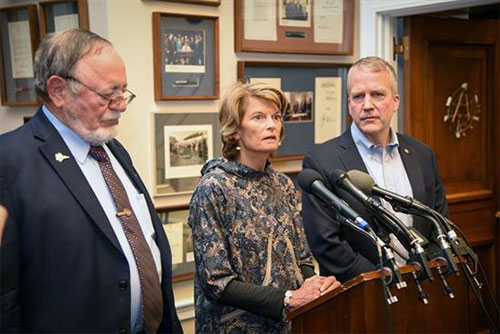
Alaska Priorities in Year-End Budget Bills Signed by President Trump Include Support for Critical Programs and Tax ReliefBy MARY KAUFFMAN
December 28, 2019
In addition, the bill packages include provisions that will help keep the cost of healthcare down by preventing burdensome taxes. The Affordable Care Act’s (ACA) “Cadillac tax” will be permanently repealed. This tax on high-cost insurance plans would have hit Alaska harder than anywhere else in the nation, because healthcare is more expensive in rural, low population states. Also permanently repealed are the excise tax on health insurance providers and the ACA-mandated tax on medical devices including pacemakers, artificial joints, defibrillators, and other items. “This funding package is the culmination of months of hard work and thoughtful consideration by members - a true bipartisan compromise. We avoided a government shutdown and fund important initiatives and programs,” said U.S. Senator Lisa Murkowski (R-AK).
In a prepared statement U.S. Senator Dan Sullivan (R-AK) said after voting on Dec. 19, to fund the federral government though the end of the fiscal year September 30, 2020, “While I continue to believe that the process by which we fund the government is fundamentally flawed and must be reformed, these bills include significant wins for Alaskans. At long last, we were able to repeal the Affordable Care Act’s so-called Cadillac Tax. This tax, up to 40 percent on health insurance plans, threatened the vast majority of plans offered in Alaska - including union plans and plans offered to state workers - and had the potential to collapse the entire health insurance market in Alaska had it been fully implemented. We were also able to do away with the ‘Kiddie Tax,’ which, among others things, targeted young Alaskans receiving their PFDs, and we were able to provide tax relief for those impacted by the 2018 Southcentral earthquake. I also fought hard to make sure this bill funded the Secure Rural Schools Program. Further, we made continued progress on substantial Alaska military investments, including over $50 million of Coast Guard infrastructure investments to be ready to take new ships arriving in Kodiak and Southeast. I’ve continued to press for these investments as chair of the Senate Armed Services Subcommittee on Readiness, and also as Chair of the Senate Commerce Subcommittee on Security. I applaud Senator Murkowski for her diligent work on the Senate Appropriations Committee and Congressman Young for securing these provisions in the House.” Murkowski said, “The priorities in this bill will develop much-needed infrastructure and create greater economic opportunities, lower energy costs, help communities facing coastal erosion, and prioritize our national defense. I’m particularly proud of the provisions I secured that support Alaska’s fisheries, promote America’s growing role as an Arctic Nation, and help to protect our people, water, and lands. I’m proud we continue to make progress towards a fleet of icebreakers, by providing funding for long-lead materials for a second heavy polar security cutter. The permanent repeal of Affordable Care Act health related taxes will give lasting relief, ensuring Alaskans don’t see steeper insurance premiums.” Alaska Congressman Don Young(R-AK) released the following statement following a House vote on two appropriations packages on December 17, 2019. “I am grateful to negotiators in both parties in the House and Senate for agreeing on the appropriations packages passed out of the House today. I am pleased to see that these final appropriations bills provide crucial funding for our military, and repeal harmful taxes that drive up the cost of health care and hurt middle-class families. I am also proud to have helped secure a 2-year extension of the Secure Rural Schools Program that many Alaskan communities rely on to fund schools and infrastructure. The appropriations package also contained important wins for our rural hospitals and village clinics, in addition to providing critical funding to help combat hunger and expand access to proper nutrition in our communities. I have been a strong advocate for combating domestic violence and child abuse, particularly in rural areas, and I am pleased to see resources made available to combat violence against women and bring perpetrators of these heinous crimes to justice. This was a well-rounded bill that delivers many important results for Alaskans, and I look forward to President Trump signing these packages into law.” (The President signed Dec. 20, 2019) (Note: Numbers are nationwide program funding levels. Numbers for Alaska are noted.) Agriculture, Rural Development, and Food & Drug Administration - Click here for a more comprehensive list of funding details. ) In the funding bill signed by President Trump, Senator Murkowski secured a provision which requires any food produce entering the U.S. market containing Genetically Engineered salmon to be clearly labeled “genetically engineered”. The legislation includes $5 million for a program previously created by Senator Murkowski, the Micro-Grants for Food Security Program, to help support Alaskans’ ability to grow their own food. The funding package works to ensure low-income families, women, and children have greater food security by including, $67.88 billion for the Supplemental Nutrition Assistance Program (SNAP), $6 billion for the Special Supplemental Nutrition Program for Women, Infants and Children (WIC) and $526.3 million for the Summer Food Service Program (SFSP). The legislation includes a range of priorities to help address some of rural Alaska’s unique challenges, including support for rural water and waste program loans to further develop rural areas, to help offset the high costs of energy in remote communities, and to help develop essential community infrastructure in rural Alaska and Native villages to help meet basic quality of life needs. Commerce, Justice, Science - Click here for a more comprehensive list of funding details. Senator Murkowski also helped secure increased funding to $502.5 million for Violence Against Women Prevention and Prosecution programs, including support for research relating to the incidence of Missing and Murdered Indigenous Women and Girls and violence against Indian women in remote communities underserved by law enforcement resources. Language is included directing the Department to improve coordination, including data sharing, training and technical assistance, and other relevant resources to better address and prevent violent crime in Indian Country. The bill also includes a five percent set-aside from Victims of Crime Act Fund for Tribes to address services for victims of domestic and sexual violence, as well as $235 million for the Community Oriented Policing Services (COPS) program, an initiative to increase the number of police officers and ensure they are properly trained. The bill provides $125 million for implementation of the STOP School Violence Act, legislation that Senator Murkowski cosponsored, which helps ensure lifesaving resources are available to states and schools to stop violence before it happens. Senator Murkowski pushed to establish federal funding and frameworks to build on America’s strategic role in the Arctic. This bill includes $8.3 billion for the National Science Foundation (NSF), as well as language directing the NSF to consider the impact of the opening of the two transarctic sea routes and the proximity to deep-water U.S. ports. The bill includes support for Oceanic and Atmospheric Research (OAR), which includes $6 million to help us better understand the complex and rapidly changing Arctic region. Building on previous efforts, the bill also contains language to address Hydrographic Survey Priorities in the Arctic. To help increase understanding of the growing impacts of ocean acidification on our ocean resources and coastal communities, $12 million is provided. In support of Alaska’s seafood industry, Senator Murkowski helped secure $65 million for the Pacific Coastal Salmon Recovery Fund which helps maintains Pacific Salmon populations and supports both the recovery and protection of all stocks. An increase to $35.5 million, is included for salmon management activities, including implementing the Pacific Salmon Treaty terms across the Northwest states. Defense Click here for a more comprehensive list of funding details. “The Arctic is a rapidly evolving region but our vision remains focused on ensuring peace, opportunity, and collaboration, with America recognized and serving as a strong leader in the region. The greater understanding that we have of what’s happening in the region, including activities with military implications, the better prepared we can be to protect and defend our nation’s interests. I’m proud this bill supports that strategy,” said Senator Murkowski. “As we work to develop legislation that addresses the greatest needs of Alaska and our military, I thank Senator Sullivan for his leadership as member of the Senate Armed Services Committee and for the significant provisions he helped secure in this bill.” “The passage of this year’s NDAA – the fifty-ninth successive passage of this bill – shows that members of Congress can rise above partisan politics to perform their most important constitutional duty, to provide for the common defense,” said Senator Sullivan. “This bill focuses our military on the 2018 National Defense Strategy’s push to address great power competition with Russia and China, particularly in the Arctic, undoes a long-standing, discriminatory provision that targeted Native businesses competing for large DOD contracts, and provides support for Alaska’s military priorities. Importantly, it also gives our service members a well-deserved 3.1 percent pay increase, the highest in a decade.” “Over the past year, I have observed a sea change in how the media now covers the Arctic, namely as an emerging area of great power competition,” said Senator Sullivan. “Unfortunately, while even the press has come to recognize this fact, the Department of Defense has maintained a myopic view of how changing Arctic conditions affect our national security. Due to strong bipartisan support on the Senate Armed Services Committee, we continue to compel the DOD to think strategically about Arctic issues. This year’s NDAA includes several key Arctic provisions to help lay the foundation for a Strategic Arctic Port, better understand Russian and Chinese activities in the region, and carry out much-needed planning for potential mass-casualty scenarios in this remote and austere territory. The U.S. is an Arctic nation because of Alaska, and working with Senator Murkowski and Congressman Young, we continue to make progress on advancing critical Arctic initiatives in this strategically-important corner of the world.” “I’ve always said that there are no greater champions of our military than the people of Alaska,” said Senator Sullivan. “Our state sells itself. This year’s National Defense Authorization Act (NDAA) provides important resources for the military in Alaska and the Alaska communities that support it. The bill takes a number of important steps to address the impacts of PFAS exposure and contamination, nearly doubles the size of the Innovative Readiness Training Program, seeks plans to modernize JPARC with advanced threats and the addition of F-35 Aggressors to augment Eielson’s aging F-16 Aggressors, and authorizes a new DOD program to support small spaceports, like the one in Kodiak.” The funding package includes a 3.1 percent pay raise for military personnel. Also provides increased funding for F-35A Joint Strike Fighter Aircraft, as well as support for design, development, and installation of digital modifications to older threat systems or simulators, which will significantly improve usefulness to the F-35 community for testing and training. The Alaska Wing of the Civil Air Patrol performs over 95 percent of all aircraft search and rescue mission for the U.S. Air Force in Alaska. The bill funds the Civil Air Patrol’s at $7.1 million and provides $1.8 million for radio equipment. To better equip soldiers operating in hostile environments, $4 million is provided for the rapid deployment of cold weather clothing for the Army, including report language to encourage the Army to rapidly develop superior cold weather and Arctic clothing for soldiers –such as hand-wear, footwear, and cold/wet protective clothing systems, by also integrating fabrics that reduce weight and increase mobility in combat. In an effort to increase real world training opportunities and deployment readiness, $30 million is provided for the Innovative Readiness Training program which has brought military reservists from across the country to Alaska for advanced training in remote construction and healthcare delivery. The bill provides increased funding to ensure private spaceports, like the Pacific Spaceport Alaska in Kodiak, maintain their readiness to carry out defense missions. Defense: Alaska Interest Highlights:
Regarding Native 8(a) Contractors, Bering Straits Native Corporation President & CEO Gail R. Schubert said, “I am thankful that the Alaska Delegation understands the profound positive impact that Alaska Native Corporations have on the state of Alaska’s economy in addition to delivering benefits to our shareholders and descendants,” said BSNC “Section 811, which was enacted with no notice or discussion, resulted in a strong bias against Native contractors, thus adversely affecting revenue generation. Revenues generated from our government contracting efforts provide critical resources for delivering important shareholder benefits such as distributions, Elder dividends, scholarships, bereavement assistance and workforce development opportunities for shareholders and descendants. BSNC thanks Congressman Young and Senator Sullivan for looking out for Alaska and championing a remedy to this discriminatory provision.” The Alaska Native Claims Settlement Act (ANCSA) was greatly enhanced by changes to the SBA 8(a) program, which were made possible by the late U.S. Senator Ted Stevens. Disadvantaged small businesses, such as ANCs, would not be able to compete with large government contractors without the business development tools provided by the 8(a) Program. Energy and Water - Click here for a more comprehensive list of funding details. The report directs the Department of Energy to reestablish the Arctic Energy Office to support a renewed focus on the many energy activities in the Arctic region, including microgrids and integrated energy systems. The bill includes $20 million for methane hydrates, as well as report language encouraging the Department of Energy to perform a long-term methane hydrate production test in the Arctic. To improve energy affordability, a combined total of $367.5 million is provided for the Weatherization Assistance and State Energy Programs. In addition, the bill includes a 23 percent increase for efficiency program funding as well as energy efficiency tax incentives for residential homes and commercial buildings. The Office of Indian Energy, a program that assists tribes with energy needs and projects on their lands, is funded at $22 million, a $6 million increase, and the report includes language directing the Office of Indian Energy to design funding opportunity announcements that do not exclude tribes based on land ownership structures. The bill promotes clean energy through increased funding to $450 million for advanced nuclear reactors, including support to start an advanced reactor demonstration program. This closely tracks the provisions within S. 903, the Nuclear Energy Leadership Act, which Senator Murkowski introduced earlier this year. Denali Commission, the agency tasked with coordination of construction and infrastructure efforts in rural Alaska, including assisting communities facing coastal erosion, is funded at $15 million. As Utqiagvik’s utility corridor is currently threatened due to the coastal erosion, the bill includes report language on the importance of this project and directs the Corps to complete the erosion project report expeditiously and to proceed to project engineering and design. For shore protection projects, $50.1 million is provided. Homeland Security, Military Construction, and Veterans Affairs - Click here for a more comprehensive list of funding details. Senator Murkowski successfully advocated for robust funding for the U.S. Coast Guard, including assets and infrastructure. The bill provides $100 million for long-lead time materials for design and construction for a second Polar Security Cutter, $312 million for Offshore Patrol Cutters, and $260 million for Fast Response Cutters. Additionally, $21 million is provided for homeport projects in Sitka relating to the basing of Fast Response Cutters in Kodiak and Seward. To address military housing needs, $35.2 million is provided to build additional housing on Base Kodiak. The bill provides investments for border security, including protective barriers, as well as support for aviation security. The bill provides a total of $710 million for FEMA Fire and SAFER Grants, programs to help fire departments and volunteer firefighter organizations increase or maintain the number of trained firefighters. The bill provides an increase of $983 million, to $11.3 billion for 150 military construction projects across the globe, from new construction to renovations. The bill also provides $1.4 billion for construction, operation and maintenance of military family housing. The bill includes $8.9 billion to implement the VA MISSION Act, legislation aimed to improve VA healthcare delivery, remove barriers to care, address VA personnel shortages, and expand eligibility for VA’s Caregiving Program to veterans of all generations. To support medical treatment and healthcare for approximately 9.3 million eligible enrolled patients the bill provides $81 billion, which includes support for mental health, telehealth services, rural health initiatives, and for opioid misuse prevention and treatment. Interior and Environment [Note: Senator Murkowski is chairman of the Interior-Environment Appropriations Subcommittee.] - Click here for a more comprehensive list of funding details. “I’m proud of all we’ve done to invest in important programs that will empower communities to thrive,” said Senator Murkowski. “This Interior appropriations bill is critical to Alaska as it funds agencies that have a large presence in our state, such as the Bureau of Land Management, National Park Service and Forest Service. This bill provides much-needed stability by directing resources where they are needed most - from basic water and sewer projects for rural communities, to ensuring communities like Fairbanks are eligible for grants to support wood stove change-outs in order to help reduce air pollution, and support for local governments to provide vital services including firefighting and police protection. This bill is the product of good, bipartisan work, directing significant resources towards protecting our people, land, and water.” The pressing issue of PFAS contamination is addressed in the bill through new funding for research and EPA grant programs which support state-led cleanup and remediation efforts of PFAS contaminated water sources, water systems, and lands. Increased funding is allocated for addressing transboundary water river quality, specifically for stream gauges and a water quality baseline strategy, including directing the U.S. Geological Survey to work cooperatively with local tribes, stakeholders, and other federal agencies necessary to help develop a water quality strategy for transboundary rivers. The bill also recognizes the importance of the Bristol Bay ecosystem and the concerns the EPA, Department of the Interior, the National Marine Fisheries Service, the State of Alaska and independent experts have raised with regard to the U.S. Army Corps of Engineers’ draft Environmental Impact Statement for the proposed Pebble Mine. The bill reaffirms that sound science must drive the permitting process and that if the concerns raised by the agencies cannot be answered within the process, then the agencies should exercise their authority to protect the region’s world-class salmon fisheries. Full funding of $500 million is included for the Payment in Lieu of Taxes (PILT) program which provides monetary compensation to local governments that contain federal lands that are not subject to state or local taxation. A two-year extension is provided for the Secure Rural Schools program, which will provide fiscal certainty for many Alaskan communities. This bill not only invests in fire suppression, it also invests in state and volunteer fire assistance and provides increased funding for the Department of the Interior and the Forest Service for preventative measures that can be made in advance of wildfire season, such as hazardous fuels reduction. To improve water, wastewater, and drinking water systems in rural Alaska, the bill provides $2.76 billion for the Environmental Protection Agency’s (EPA) State Water Revolving Funds program, $29.2 million for EPA’s Alaska Native Villages Water program, and $25.8 million for a grant program, to bring basic infrastructure to communities in need. The bill also addresses PFAS contamination by providing $20 million in increases to EPA grant programs to support state-led cleanup and remediation efforts of PFAS contaminated water sources, water systems, and lands. New this year, the bill provides $6.5 million to address the crisis of missing, trafficked, and murdered indigenous women by providing support for cold case investigations, equipment, training, and background checks. Increased funding is provided for implementation of Violence Against Women Act (VAWA) programs to improve training and address specific tribal court needs. The bill increases funding for to Public Law 280 states, such as Alaska, in order to help develop tribal court systems for communities. The bill also encourages the Indian Health Service to look at programs which can help educate community health aides on trauma informed care and collecting medical evidence. “Turning the tide of this crisis has truly become an ‘all-hands-on-deck’ effort, from legislative initiatives, to tribal support, and as well as a directed focus from the administration. These investments reinforce our commitment to pursuing justice for the many women and girls that have fallen victim to this epidemic and to preventing more sisters, mothers, and daughters from experiencing these horrors,” said Senator Murkowski. “This bill package works to improve coordination among law enforcement and provide the necessary resources so that these families—these communities—have hope.” Interior and Environment as well as Commerce, Justice, Science Bill Highlights:
Labor, Health & Human Services, Education and Related Agencies - Click here for a more comprehensive list of funding details. The bill provides $25 million for the CDC to research gun violence, specifically to understand the underlying causes and evidence-based methods of crime prevention. Senator Murkowski continues to build on her longstanding efforts to protect youth from the harmful impacts of e-cigarettes and vaping products, through language encouraging the CDC to identify strategies to promote youth cessation and encourages flexibility within the National Tobacco Control Program to ensure State and local health departments are able to direct adequate resources to turn the tide of youth use of e-cigarettes. New this year, funding is provided for a new CDC effort to address the devastating impacts and increasing rates of suicide. The bill invests in Alaskans’ workforce training and education by providing support for high quality educational and job training opportunities for Alaskans of all ages, including $1.7 billion for Job Corps to provide career and technical training, $175 million for Department of Labor apprentice programs, and $35.9 million for the Alaska Native Educational Equity Program (ANEP) to fund supplemental educational programs that help meet the unique needs of Alaska Native schoolchildren. Additionally, the bill provides $18.3 million to strengthen Alaska Native and Native Hawaiian Serving Institutions, including several University of Alaska campuses. To provide assistance with home energy costs to low-income households, with a focus on seniors and homes with young children, the bill includes $3.7 billion for the Low Income Home Energy Assistance Program (LIHEAP). Transportation, Housing, and Urban Development - Click here for a more comprehensive list of funding details. The funding package provides $162 million for Essential Air Service, to support access for rural communities otherwise isolated from the National Air Transportation System. The BUILD grant program is funded at $1 billion, an increase of $100 million from last year’s levels, to provide investments in road, rail, transit, and port projects to repair and maintain transportation networks that are critical to Alaska. Also includes $20 million in assistance to small shipyards. To help address housing needs for at-risk and homeless Native Veterans residing on tribal lands, the legislation allocates $1 million to continue the Tribal HUD-Veterans Affairs Supportive Housing (HUD-VASH) Program. Senator Murkowski secured language which encourages the Secretary of the Department of Housing and Urban Development to enter into cooperative agreements with philanthropic entities, other Federal agencies, State or local governments, Indian tribes, colleges, or universities for research into sustainable housing design, development, and construction for cold climates.
Source of News:
|
|||||




